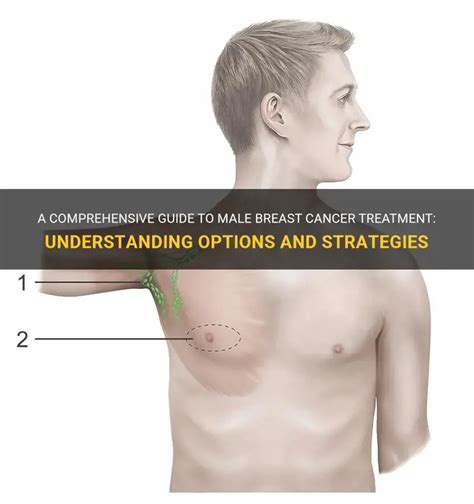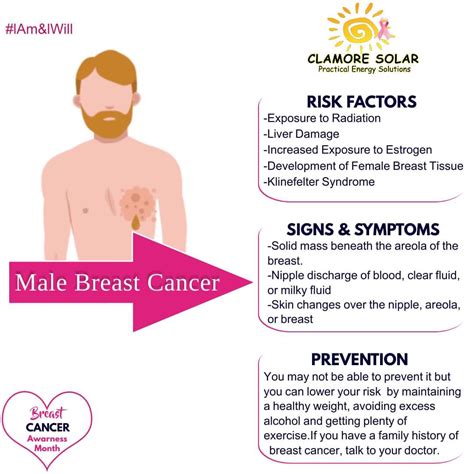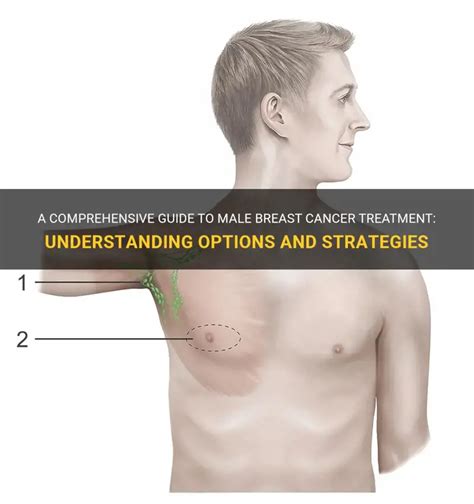Intro
Discover the truth about mens breast cancer, a rare disease often overlooked. Learn symptoms, risk factors, and treatment options for male breast cancer, including genetic factors and screening methods.
Breast cancer is often perceived as a disease that affects only women, but the reality is that men can also develop breast cancer. Although the incidence of breast cancer in men is relatively low, it is essential to raise awareness about the risks, symptoms, and treatment options available for male breast cancer. In this article, we will delve into the world of male breast cancer, exploring its causes, diagnosis, and management. By understanding this condition, we can work together to promote early detection, improve treatment outcomes, and support those affected by male breast cancer.
The importance of discussing male breast cancer cannot be overstated. Despite being a rare condition, male breast cancer can have a significant impact on the lives of those affected. By acknowledging the risks and symptoms of male breast cancer, we can encourage men to seek medical attention if they experience any unusual changes in their breast tissue. This, in turn, can lead to earlier diagnosis and more effective treatment. Moreover, raising awareness about male breast cancer can help reduce the stigma associated with the condition, promoting a culture of openness and support.
Male breast cancer is a type of cancer that develops in the breast tissue of men. It is often referred to as male breast carcinoma or male mammary carcinoma. Although the exact causes of male breast cancer are not fully understood, research suggests that it may be linked to a combination of genetic, hormonal, and environmental factors. For instance, men with a family history of breast cancer, particularly those with a history of BRCA2 gene mutations, are at a higher risk of developing the condition. Additionally, men who have been exposed to high levels of estrogen, either through hormone replacement therapy or other medical conditions, may also be at increased risk.
Understanding Male Breast Cancer

Risk Factors for Male Breast Cancer
Several risk factors have been identified as increasing the likelihood of developing male breast cancer. These include: * Age: Male breast cancer is more common in older men, with most cases diagnosed in men over the age of 60. * Family history: Men with a family history of breast cancer, particularly those with a history of BRCA2 gene mutations, are at higher risk. * Radiation exposure: Men who have been exposed to high levels of radiation, either through medical treatment or occupational exposure, may be at increased risk. * Hormonal imbalance: Men with high levels of estrogen, either through hormone replacement therapy or other medical conditions, may be at increased risk. * Obesity: Being overweight or obese may increase the risk of developing male breast cancer.Diagnosis and Staging of Male Breast Cancer

Once a diagnosis of male breast cancer has been made, the cancer will be staged to determine its extent and severity. The staging process typically involves a combination of imaging tests, blood tests, and physical examination. The stages of male breast cancer are:
- Stage 0: Cancer is limited to the ducts or lobules and has not spread to surrounding tissue.
- Stage I: Cancer has spread to surrounding tissue but is still relatively small.
- Stage II: Cancer has spread to nearby tissue and may have spread to lymph nodes.
- Stage III: Cancer has spread to more distant tissue and may have spread to lymph nodes.
- Stage IV: Cancer has spread to distant parts of the body, such as the lungs, liver, or brain.
Treatment Options for Male Breast Cancer
Treatment for male breast cancer typically involves a combination of surgery, radiation therapy, and chemotherapy. The specific treatment approach will depend on the stage and severity of the cancer, as well as the individual's overall health and preferences. Some common treatment options for male breast cancer include: * Mastectomy: Surgical removal of the breast tissue. * Lumpectomy: Surgical removal of the tumor and surrounding tissue. * Radiation therapy: Use of high-energy rays to kill cancer cells. * Chemotherapy: Use of medications to kill cancer cells. * Hormone therapy: Use of medications to block the production of hormones that fuel cancer growth.Living with Male Breast Cancer

In addition to emotional support, men with breast cancer may need to make lifestyle adjustments to manage their condition. This may include changes to diet and exercise, as well as strategies to manage stress and anxiety. Some tips for living with male breast cancer include:
- Stay informed: Learn as much as you can about your condition and treatment options.
- Seek support: Connect with other men who have experienced breast cancer, either through support groups or online forums.
- Prioritize self-care: Engage in activities that promote relaxation and stress reduction, such as meditation or yoga.
- Maintain a healthy lifestyle: Eat a balanced diet, exercise regularly, and get enough sleep.
Coping with the Emotional Impact of Male Breast Cancer
The emotional impact of male breast cancer can be significant, and it is essential to acknowledge and address these feelings. Some common emotional challenges faced by men with breast cancer include: * Body image issues: Men may experience changes in their body image, particularly if they have undergone mastectomy or other surgical procedures. * Fertility concerns: Men with breast cancer may experience fertility issues, either due to the cancer itself or as a result of treatment. * Relationship challenges: Men with breast cancer may experience changes in their relationships, particularly if they are struggling to cope with their emotions.To cope with the emotional impact of male breast cancer, men may find it helpful to:
- Seek counseling: Connect with a mental health professional who can provide emotional support and guidance.
- Join a support group: Connect with other men who have experienced breast cancer, either in person or online.
- Practice self-care: Engage in activities that promote relaxation and stress reduction, such as meditation or yoga.
Prevention and Early Detection of Male Breast Cancer

In addition to these steps, men can also take proactive measures to reduce their risk of developing breast cancer. Some strategies include:
- Maintaining a healthy weight: Being overweight or obese may increase the risk of developing male breast cancer.
- Avoiding radiation exposure: Men who have been exposed to high levels of radiation, either through medical treatment or occupational exposure, may be at increased risk.
- Avoiding hormone replacement therapy: Men who are taking hormone replacement therapy may be at increased risk of developing breast cancer.
Current Research and Future Directions
Research into male breast cancer is ongoing, and scientists are working to better understand the causes, diagnosis, and treatment of the condition. Some areas of current research include: * Genetic studies: Scientists are working to identify genetic mutations that may increase the risk of developing male breast cancer. * Hormonal studies: Researchers are investigating the role of hormones in the development and progression of male breast cancer. * Treatment studies: Scientists are working to develop more effective treatments for male breast cancer, including new medications and surgical techniques.As research continues to advance our understanding of male breast cancer, it is likely that new and innovative treatments will become available. Some potential future directions for research include:
- Personalized medicine: Scientists may develop personalized treatment approaches that take into account an individual's unique genetic and hormonal profile.
- Immunotherapy: Researchers may explore the use of immunotherapy, which harnesses the power of the immune system to fight cancer.
- Targeted therapies: Scientists may develop targeted therapies that specifically target the genetic mutations or hormonal imbalances that drive male breast cancer.
What are the symptoms of male breast cancer?
+The symptoms of male breast cancer may include a lump or swelling in the breast, nipple discharge or inversion, and changes in the skin covering the breast. Men may also experience pain or tenderness in the breast, although this is not always a symptom of cancer.
How is male breast cancer diagnosed?
+Diagnosing male breast cancer typically involves a combination of physical examination, imaging tests, and biopsy. A doctor may perform a physical examination to check for any lumps or abnormalities in the breast tissue. Imaging tests, such as mammography or ultrasound, may be used to visualize the breast tissue and identify any suspicious areas. A biopsy, which involves removing a sample of tissue for examination under a microscope, is usually necessary to confirm the diagnosis.
What are the treatment options for male breast cancer?
+Treatment for male breast cancer typically involves a combination of surgery, radiation therapy, and chemotherapy. The specific treatment approach will depend on the stage and severity of the cancer, as well as the individual's overall health and preferences. Some common treatment options for male breast cancer include mastectomy, lumpectomy, radiation therapy, chemotherapy, and hormone therapy.
Can male breast cancer be prevented?
+While there is no guaranteed way to prevent male breast cancer, there are steps that men can take to reduce their risk. These include knowing your risk factors, performing regular self-exams, and seeking medical attention if you notice any changes or symptoms. Men can also take proactive measures to reduce their risk, such as maintaining a healthy weight, avoiding radiation exposure, and avoiding hormone replacement therapy.
What is the prognosis for male breast cancer?
+The prognosis for male breast cancer depends on the stage and severity of the cancer, as well as the individual's overall health and response to treatment. With prompt diagnosis and treatment, many men with breast cancer can experience a full recovery. However, the prognosis may be poorer for men who are diagnosed at a later stage or who have more aggressive forms of the disease.
In
Final Thoughts

We invite you to share your thoughts, questions, and concerns about male breast cancer in the comments section below. Your input is invaluable in helping us to better understand the needs and concerns of our readers. Additionally, we encourage you to share this article with others who may be interested in learning more about male breast cancer. Together, we can make a difference and promote a culture of awareness, support, and understanding.
